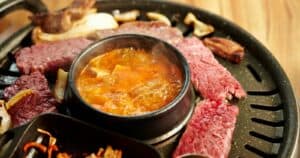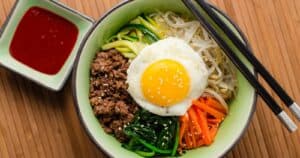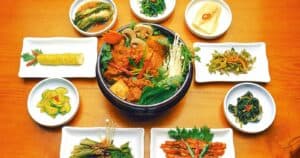Craving for delicious Korean food but worried about its halal status? Don’t fret! In this blog post, we will guide you on how to check if Korean food is halal-friendly, so you can indulge in the flavors without any worries.
We understand that finding halal Korean food can be a challenge, especially since halal certification is not yet widely practiced in Korea. However, we have gathered some helpful tips to assist you in your search and ensure a halal dining experience.
The Importance of Halal Certification in Korean Food
Halal certification plays a crucial role in the Korean food industry, providing various benefits for both businesses and consumers. Here are three key reasons why halal certification is important in Korean food:
Ensuring Halal Compliance: Halal certification serves as a reliable way for Muslims to determine whether a product is halal-compliant. With certification, it becomes easier for Muslim consumers to identify Korean food that adheres to Islamic dietary laws, giving them assurance that the food they consume is permissible and meets their religious requirements.
Marketing Strategy and Accomplishment: Obtaining halal certification is seen as an accomplishment for Korean food establishments. It provides businesses with a strategic advantage in targeting the growing Muslim population and attracting Muslim customers who actively seek halal options. Moreover, having the certification helps Korean restaurants and food manufacturers differentiate themselves in the market.
Trust and Credibility: Halal certification instills trust and credibility among consumers, not only for Muslims but also for non-Muslims who are conscious of food quality and religious dietary practices. The certification demonstrates that Korean food businesses follow strict guidelines and standards, ensuring the reliability and authenticity of their halal products and services.
Additionally, halal certification enables Korean food businesses to expand their market reach globally. With the global halal market estimated to be worth trillions of dollars, obtaining halal certification allows Korean food products to be exported to Muslim-majority countries and cater to the needs of Muslim consumers worldwide. This presents immense opportunities for Korean food businesses to tap into new markets and increase their revenue.
However, it is worth noting that obtaining halal certification in countries like Malaysia can be challenging for Korean food establishments. Such challenges may include navigating complex certification processes and meeting specific halal requirements. Despite these obstacles, it is crucial for Korean food businesses to persevere and work towards obtaining halal certification. Doing so not only helps them expand their market presence but also enables them to better serve Muslim consumers and meet their dietary preferences.
Identifying Halal certification on Korean Food Products
Halal certification is important in ensuring the reliability and credibility of halal products and services. However, in Korea, halal certification is not yet a standard practice. Nonetheless, there are some halal-certified Korean foods available. The Korea Muslim Federation (KMF) is the main halal certification awarding agency in Korea, although its certification is only recognized in Malaysia and the local market.
When searching for halal-certified foods in Korea, it is essential to learn how to read Korean food labels and inquire about halal options from restaurant staff. Additionally, Crown Confectionery is one of the Korean companies that has obtained halal certification for its Kuk He, a chocolate-cream snack.
It is worth noting that the KMF’s halal certification is not recognized by some countries, such as Indonesia. However, having a halal certificate can serve as a marketing strategy for restaurants and is considered an accomplishment. Obtaining halal certification enables Korean food businesses to tap into the global halal market and cater to the needs of Muslim consumers worldwide.
Delectable Halal-Friendly Korean Dishes to Savor
If you’re looking to indulge in halal-friendly Korean cuisine, there are several delectable dishes you must try. From comforting stews to flavorful rice dishes, here are some options that will surely satisfy your taste buds:
Soft Tofu Stew: This comforting and spicy stew is made with soft tofu, vegetables, and sometimes seafood or meat. It’s a popular dish that offers a soothing and satisfying experience.
Soybean Paste Stew: Made with fermented soybean paste, vegetables, and often includes tofu or meat, this hearty stew is packed with rich flavors and textures.
Kimchi Stew (Kimchi Jjigae): This flavorful stew combines kimchi, pork, tofu, and various vegetables to create a mouthwatering and spicy dish that will leave you wanting more.
Bibimbap: A beloved Korean dish, bibimbap consists of a bowl of rice topped with sautéed vegetables, meat or tofu, and a fried egg. It is traditionally served with spicy gochujang sauce, adding a kick of heat to this wholesome meal.
Rice with Sliced Raw Fish (Hwe Dup Bap): For a refreshing and light option, try rice with thinly sliced raw fish. This dish is often accompanied by various side dishes, offering a well-rounded and satisfying meal.
Green Onion Pancake (Pajeon): This savory pancake made with green onions and sometimes seafood is fried to crispy perfection. Pajeon is a popular street food in Korea, offering a delightful combination of flavors and textures.
Sundubu Jjigae (Soft Tofu Stew): Another variation of the soft tofu stew, sundubu jjigae is a spicy and silky tofu stew that is often made with seafood or meat. It is typically served with rice for a complete and satisfying meal.
Vegetable Bibimbap: For vegetarians, vegetable bibimbap is a great option. It features a variety of sautéed vegetables, tofu, and a fried egg, offering a colorful and flavorful combination.
Japchae: This stir-fried dish is made with sweet potato glass noodles, vegetables, and often includes meat or tofu. Japchae offers a balanced blend of flavors and textures, making it a popular and satisfying choice.
Kimchi Fried Rice: Made with kimchi, rice, and various vegetables, kimchi fried rice is a flavorful and satisfying dish that is often topped with a fried egg. It’s a great option for those looking for a spicy and hearty meal.
When searching for halal Korean food, it’s important to check the ingredients used and the preparation methods at each restaurant. Additionally, you can seek recommendations from local halal certification boards or online resources that provide information on halal-friendly dining options. By being open-minded, adventurous, and doing your research, you can enjoy the diverse and delectable range of halal-friendly Korean dishes available.





